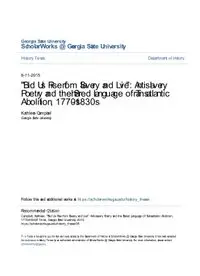Table Of ContentGeorgia State University
ScholarWorks @ Georgia State University
History Teses Department of History
8-11-2015
"Bid Us Rise from Slavery and Live": Antislavery
Poetry and the Shared Language of Transatlantic
Abolition, 1770s-1830s
Kathleen Campbell
Georgia State University
Follow this and additional works at: htps://scholarworks.gsu.edu/history_theses
Recommended Citation
Campbell, Kathleen, ""Bid Us Rise from Slavery and Live": Antislavery Poetry and the Shared Language of Transatlantic Abolition,
1770s-1830s." Tesis, Georgia State University, 2015.
htps://scholarworks.gsu.edu/history_theses/95
Tis Tesis is brought to you for free and open access by the Department of History at ScholarWorks @ Georgia State University. It has been accepted
for inclusion in History Teses by an authorized administrator of ScholarWorks @ Georgia State University. For more information, please contact
“BID US RISE FROM SLAVERY AND LIVE”: ANTISLAVERY POETRY AND THE
SHARED LANGUAGE OF TRANSATLANTIC ABOLITION, 1770S-1830S
by
KATHLEEN CAMPBELL
Under the Direction of Robert Baker, PhD
ABSTRACT
The following analysis of antislavery poetry evidences the shared language of abolition that
incorporated the societal dynamics of law, gender, and race through shared themes of family, the
assumed expectation of freedom, and legal references. This thesis focuses upon four women
antislavery poets and analyzes their poems and their individual experiences with their
sociohistorical contexts. The poems of Hannah More, Ann Yearsley, Phillis Wheatley, and Sarah
Forten show this shared transatlantic language of abolition.
INDEX WORDS: antislavery poetry, abolition, transatlantic, gender, modern slavery
“BID US RISE FROM SLAVERY AND LIVE”: ANTISLAVERY POETRY AND THE
SHARED LANGUAGE OF TRANSATLANTIC ABOLITIOIN, 1770S-1830S
by
KATHLEEN CAMPBELL
A Thesis Submitted in Partial Fulfillment of the Requirements for the Degree of
Master of Arts
in the College of Arts and Sciences
Georgia State University
2015
Copyright by
Kathleen Devor Campbell
2015
“BID US RISE FROM SLAVERY AND LIVE”: ANTISLAVERY POETRY AND THE
SHARED LANGUAGE OF TRANSATLANTIC ABOLITIOIN, 1770S-1830S
by
KATHLEEN CAMPBELL
Committee Chair: Robert Baker
Committee: Julia Gaffield
Electronic Version Approved:
Office of Graduate Studies
College of Arts and Sciences
Georgia State University
August 2015
iv
DEDICATION
I dedicate this thesis to my amazing family for encouraging me in every moment in my
life and in this process and for showing me how to walk with an authentic faith.
v
ACKNOWLEDGEMENTS
I wish to express sincere gratitude to Dr. Robert Baker and Dr. Julia Gaffield for their
invaluable feedback, guidance, and encouragement. I also wish to extend my thanks to Megan
Neary for her support and editing.
vi
TABLE OF CONTENTS
ACKNOWLEDGEMENTS ............................................................................................. v
1 INTRODUCTION....................................................................................................... 1
1.1 Historiography ...................................................................................................... 2
1.2 Methodology ......................................................................................................... 6
1.3 Organization ....................................................................................................... 11
1.4 Terminology ........................................................................................................ 14
1.5 Conclusion ........................................................................................................... 14
2 “THEY STILL ARE MEN, AND MEN SHOU’D STILL BE FREE” ................ 15
2.1 “Oppression’s fall’n, and Slavery is no more!”: Hannah More .................... 15
2.2 “Why gaze as thou wouldst fright me from my challenge”: Ann Yearsley .. 29
2.3 Conclusion ........................................................................................................... 39
3 “NO LONGER SHALL THOU DREAD THE IRON CHAIN” .......................... 39
3.1 “Wonder from whence my love of Freedom sprung” ..................................... 41
3.2 “Where freedom is the grand object of the law”: Somerset v. Stewart .......... 47
3.3 “We are enabled this day to add one more step” ............................................ 57
3.4 Conclusion ........................................................................................................... 63
4 “OH! MOTHER, WEEP NOT, THOUGH OUR LOT BE HARD” .................... 64
4.1 “And death, to the captive, is freedom and rest”: Sarah Forten ................... 65
vii
4.2 “No evil […] so great as the abuse of man’s liberty”: Philadelphia and
Inequality 75
4.3 “Dare to be good”: Women and Abolition ....................................................... 79
4.4 Family or Freedom?: Commonwealth v. Aves ................................................ 86
4.5 Conclusion ........................................................................................................... 91
5 “HAVE I BEEN FORGOTTEN” ............................................................................ 92
6 “AND WHEN THOU HAST TO HIGH PERFECTION WROUGHT THIS
MIGHTY WORK” ................................................................................................................... 105
Bibliography: Works Cited and Consulted ................................................................ 108
1
1 INTRODUCTION
The established (and protected) position of slavery within the Atlantic World required a
variegated attack from those who viewed freedom and personhood of greater value and
importance than property. Abolitionists aimed to reveal the inherent moral wrong of slavery
through literature, legislation efforts, and freedom suits. Covering this broad range of strategy
was a shared network of antislavery language that bolstered and connected abolitionists of
diverse backgrounds and sociohistorical contexts. Antislavery poets incorporated this language
into emotional verse in order to convince readers of the immorality of slavery through a
particular set of themes. The separation of the family through the slave trade and enslavement
process featured prominently in antislavery poetry and connected to understandings of the
importance of family within natural law. Within this theme, gendered representations of the
patriarchal family reflect the current of conservatism particularly within the late eighteenth
century abolition movement. Another shared theme was the antislavery poet’s assumption that
every enslaved individual hoped for freedom. This theme similarly played out in certain freedom
suits initiated by antislavery leaders or organizations, particularly the 1836 case of
Commonwealth v. Aves in Massachusetts. A third theme is the use of legal references to
courtroom style questioning or trial references to highlight the legal, criminal wrong of slavery.
To what extent did antislavery poetry connect to a shared abolitionist language? How
antislavery literature intersected with the law? In order to answer these questions I have chosen
four women poets that illustrate the scope of this shared language. Hannah More, Ann Yearsley,
Phillis Wheatley, and Sarah Forten created antislavery poetry across social, geopolitical, and
temporal boundaries that convey the use of these themes and the shared language of abolition.
Their poetry interacted with their individual, sociohistorical contexts through gender, class, race,

